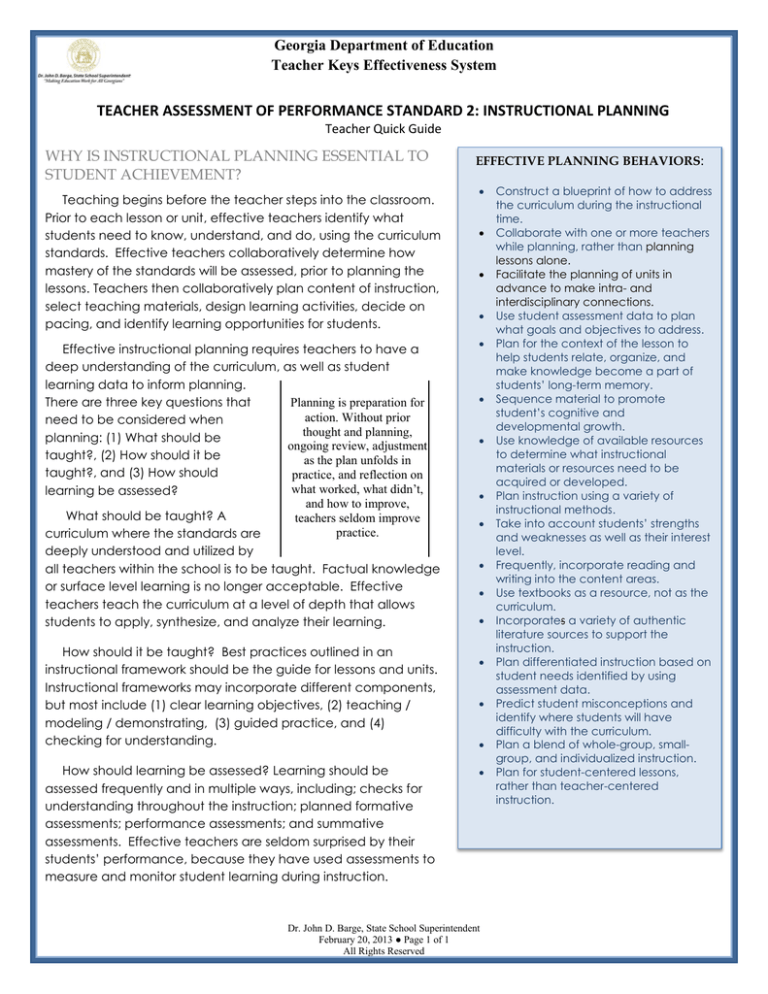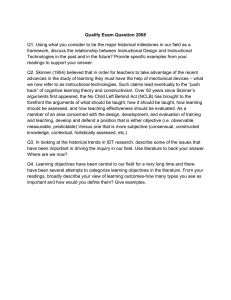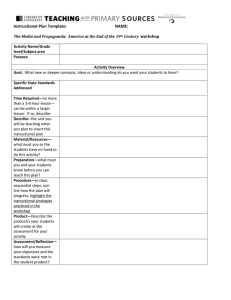
Georgia Department of Education
Teacher Keys Effectiveness System
TEACHER ASSESSMENT OF PERFORMANCE STANDARD 2: INSTRUCTIONAL PLANNING
Teacher Quick Guide
WHY IS INSTRUCTIONAL PLANNING ESSENTIAL TO
STUDENT ACHIEVEMENT?
Teaching begins before the teacher steps into the classroom.
Prior to each lesson or unit, effective teachers identify what
students need to know, understand, and do, using the curriculum
standards. Effective teachers collaboratively determine how
mastery of the standards will be assessed, prior to planning the
lessons. Teachers then collaboratively plan content of instruction,
select teaching materials, design learning activities, decide on
pacing, and identify learning opportunities for students.
Effective instructional planning requires teachers to have a
deep understanding of the curriculum, as well as student
learning data to inform planning.
There are three key questions that
Planning is preparation for
action. Without prior
need to be considered when
thought
and planning,
planning: (1) What should be
ongoing review, adjustment
taught?, (2) How should it be
as the plan unfolds in
taught?, and (3) How should
practice, and reflection on
what worked, what didn’t,
learning be assessed?
and how to improve,
What should be taught? A
teachers seldom improve
practice.
curriculum where the standards are
deeply understood and utilized by
all teachers within the school is to be taught. Factual knowledge
or surface level learning is no longer acceptable. Effective
teachers teach the curriculum at a level of depth that allows
students to apply, synthesize, and analyze their learning.
How should it be taught? Best practices outlined in an
instructional framework should be the guide for lessons and units.
Instructional frameworks may incorporate different components,
but most include (1) clear learning objectives, (2) teaching /
modeling / demonstrating, (3) guided practice, and (4)
checking for understanding.
How should learning be assessed? Learning should be
assessed frequently and in multiple ways, including; checks for
understanding throughout the instruction; planned formative
assessments; performance assessments; and summative
assessments. Effective teachers are seldom surprised by their
students’ performance, because they have used assessments to
measure and monitor student learning during instruction.
EFFECTIVE PLANNING BEHAVIORS:
•
•
•
•
•
•
•
•
•
•
•
•
•
•
•
•
Dr. John D. Barge, State School Superintendent
February 20, 2013 ● Page 1 of 1
All Rights Reserved
Construct a blueprint of how to address
the curriculum during the instructional
time.
Collaborate with one or more teachers
while planning, rather than planning
lessons alone.
Facilitate the planning of units in
advance to make intra- and
interdisciplinary connections.
Use student assessment data to plan
what goals and objectives to address.
Plan for the context of the lesson to
help students relate, organize, and
make knowledge become a part of
students’ long-term memory.
Sequence material to promote
student’s cognitive and
developmental growth.
Use knowledge of available resources
to determine what instructional
materials or resources need to be
acquired or developed.
Plan instruction using a variety of
instructional methods.
Take into account students’ strengths
and weaknesses as well as their interest
level.
Frequently, incorporate reading and
writing into the content areas.
Use textbooks as a resource, not as the
curriculum.
Incorporates a variety of authentic
literature sources to support the
instruction.
Plan differentiated instruction based on
student needs identified by using
assessment data.
Predict student misconceptions and
identify where students will have
difficulty with the curriculum.
Plan a blend of whole-group, smallgroup, and individualized instruction.
Plan for student-centered lessons,
rather than teacher-centered
instruction.





